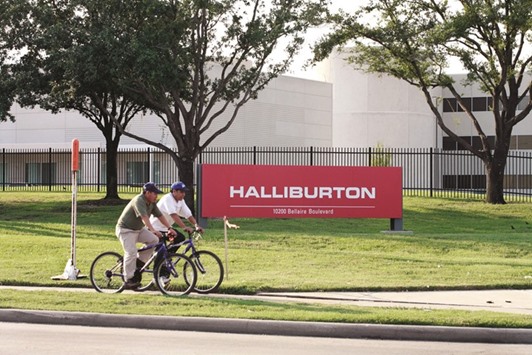Halliburton Co and Baker Hughes wasted no time making clear they will take different paths after the termination of their merger.
“Our strategy has not changed,” Halliburton Chief Executive Officer Dave Lesar told investors and analysts on a conference call yesterday. His statement came minutes after Baker Hughes wrapped up a separate conference call in which CEO Martin Craighead repeatedly said that the company was going to change its focus be “more selective” in where it does business.
Halliburton and Baker Hughes shares were both down 2.9% as of 10:01 a.m. in New York.
The $28bn takeover was called off on Sunday in the face of stiff resistance from global regulators over antitrust concerns. Lesar blamed “elongated regulatory scrutiny” and the drop in oil prices for making the deal uneconomic. While expressing disappointment with the failed bid, Lesar said he’s not backing away from more deals and still sees selective acquisitions as part of the company’s growth plan.
Larger, more complicated mergers are struggling to get timely approvals, Lesar said.
Baker Hughes, meanwhile, said it will simplify its organisational structure and pull back its pressure-pumping business to only two basins in North America to weather low prices. All other businesses will be reviewed as it looks for added cost cuts.
“Every product line has to earn its right,” CEO Craighead said.
Halliburton announced the Baker Hughes takeover in November 2014 in a bid to better compete against industry leader Schlumberger as oil prices first began to drop from above $100 a barrel.
The oil services industry is operating at a loss in North America, home to the world’s largest market for hydraulic fracturing. Schlumberger lost $10mn in the US and Canada, excluding taxes, during the first three months of the year.
Halliburton, the world’s largest provider of fracking services, recorded first-quarter costs of $378mn, or 44 cents a share, related to the Baker Hughes bid, according to a statement yesterday. That’s higher than the $79mn, or 9 cents a share, acquisition-related costs in the final three months of the year.
Remaining a full-service provider continues to be key for Halliburton despite the downturn. “It’s way better to be in every basin with every product line,” Lesar said on the call.
The second- and third-largest oil-service firms had set a deadline for the end of April to complete the deal or walk away. The US Justice Department heard concerns from dozens of companies and filed a lawsuit in early April to stop the merger, saying it threatened to eliminate head-to-head competition in 23 products and services used in oil exploration.
The government ultimately concluded that the deal was “not fixable at all,” David Gelfand, deputy assistant attorney general, told reporters on Monday on a conference call.
Halliburton Co Chief Executive Officer Dave Lesar wanted Baker Hughes bad.
Months after oil prices began to crash in 2014, Halliburton’s 62-year-old leader saw the $35bn takeover of its rival as the best path to survival. The largest deal in his company’s history meant so much to him that he threatened to go hostile after Baker Hughes balked at the price and said the transaction wouldn’t survive antitrust review. Lesar was so “absolutely confident” he could complete the deal, he offered to pay a 10% fee if it wasn’t consummated.
With the deal now scrapped because of government objections, that confidence means that Halliburton will pay a $3.5bn termination charge, the second largest in history after AT&T’s payment to Deutsche Telekom in 2011. Despite Lesar’s driving ambition to expand, investors cheered the end of the transaction, sending the stock up the most in a month at one point Monday, and analysts said Halliburton may be fine on its own.
“Halliburton Co’s outlook is promising, even after its bid for Baker Hughes failed,” Andrew Cosgrove, an analyst for Bloomberg Intelligence, said in a note. “The company remains among the most exposed to a potential recovery in North American drilling and well completions.”

Bicyclists ride past Halliburton’s Energy Services Group headquarters in Houston. Halliburton and Baker Hughes wasted no time making clear they will take different paths after the termination of their merger.
